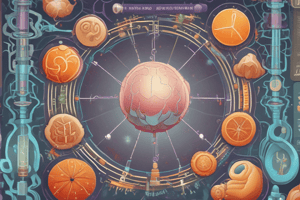Podcast
Questions and Answers
What is the active form of glucose involved in glycogen synthesis?
What is the active form of glucose involved in glycogen synthesis?
- Glucose-6-phosphate
- UDP-glucose (correct)
- Glucose-1-phosphate
- Sugar nucleotides
What type of glycosidic bonds are present in glycogen at branching points?
What type of glycosidic bonds are present in glycogen at branching points?
- $\alpha(1\rightarrow4)$ and $\alpha(1\rightarrow6)$ (correct)
- $\alpha(1\rightarrow4)$ and $\beta(1\rightarrow6)$
- $\beta(1\rightarrow4)$ and $\alpha(1\rightarrow4)$
- $\beta(1\rightarrow4)$ and $\alpha(1\rightarrow6)$
What is the rate-limiting step in glycogen synthesis?
What is the rate-limiting step in glycogen synthesis?
- Formation of branching points
- Formation of glucose-6-phosphate
- Formation of $\alpha(1\rightarrow4)$ glycosidic bonds (correct)
- Formation of UDP-glucose
What enzyme catalyzes branching in glycogen?
What enzyme catalyzes branching in glycogen?
What is the product of glycogen breakdown by glycogen phosphorylase?
What is the product of glycogen breakdown by glycogen phosphorylase?
What is the primary linkage between glucose units in the main chain of glycogen?
What is the primary linkage between glucose units in the main chain of glycogen?
Which enzyme is responsible for the breakdown of glucose units from the non-reduced end of glycogen?
Which enzyme is responsible for the breakdown of glucose units from the non-reduced end of glycogen?
Where does intense glycogen synthesis occur?
Where does intense glycogen synthesis occur?
What is the substrate of glycogen synthesis?
What is the substrate of glycogen synthesis?
How is glycogen breakdown in muscle different from that in the liver?
How is glycogen breakdown in muscle different from that in the liver?
Which enzyme converts glucose-1-phosphate to glucose-6-phosphate in cells?
Which enzyme converts glucose-1-phosphate to glucose-6-phosphate in cells?
What is the enzyme responsible for hydrolyzing glucose-6-phosphate to free glucose in the liver?
What is the enzyme responsible for hydrolyzing glucose-6-phosphate to free glucose in the liver?
Which hormone increases the synthesis of glycogen in the liver and skeletal muscle?
Which hormone increases the synthesis of glycogen in the liver and skeletal muscle?
What happens to glycogen synthase when it is phosphorylated?
What happens to glycogen synthase when it is phosphorylated?
Why can't muscle glycogen increase blood sugar levels?
Why can't muscle glycogen increase blood sugar levels?
Flashcards are hidden until you start studying
Study Notes
Glycogen Metabolism: Key Concepts
- Free glucose from glycogenolysis in the liver is released into the bloodstream for other tissues' use.
- Liver glycogen stores fluctuate, increasing in the well-fed state and depleting during fasting.
- Muscle glycogen is minimally affected by short fasting periods and moderately decreased in prolonged fasting.
- Sugar nucleotides are crucial for various hexose transformation and polymerization reactions.
- UDP-Glucose, a sugar nucleotide, is formed by a condensation reaction between a nucleoside triphosphate and a sugar phosphate.
- Glycogen consists of α(1→4) glycosidic bonds and contains α(1→6) glycosidic bonds at branching points.
- Glycogen synthesis begins with glucose-6-phosphate, which is formed from free glucose by specific enzymes.
- The synthesis of glycogen involves UDP-glucose as the active form of glucose and requires energy from ATP and UTP.
- Glycogen synthesis is initiated by UDP-glucose, with glycogenin acting as a receptor for glucose residues when glycogen is depleted.
- The rate-limiting step in glycogen synthesis is the glycogen synthase step, which forms α(1-4) glycosidic bonds.
- Branching in glycogen occurs after at least 11 glucose units and is catalyzed by the branching enzyme.
- Glycogen breakdown involves glycogen phosphorylase breaking α-1,4 glycoside bonds, leading to the release of glucose-1-phosphate.
Studying That Suits You
Use AI to generate personalized quizzes and flashcards to suit your learning preferences.




